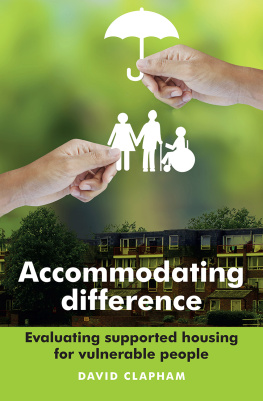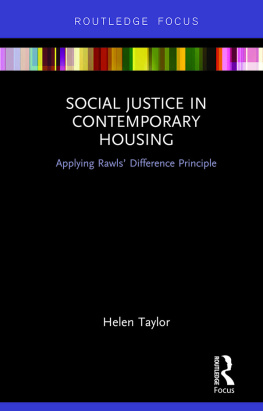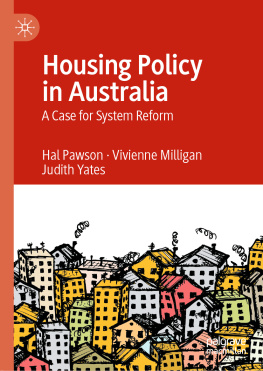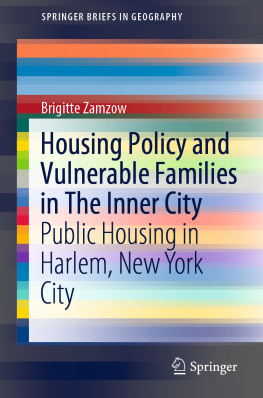
First published in Great Britain in 2015 by
Policy Press University of Bristol 1-9 Old Park Hill Bristol BS2 8BB UK Tel +44 (0)117 954 5940 e-mail
North American office: Policy Press c/o The University of Chicago Press 1427 East 60th Street Chicago, IL 60637, USA t: +1 773 702 7700 f: +1 773-702-9756
Policy Press 2015
British Library Cataloguing in Publication Data
A catalogue record for this book is available from the British Library
Library of Congress Cataloging-in-Publication Data
A catalog record for this book has been requested
ISBN 978-1-4473-0634-4 Hardcover
ISBN 978-1-4473-2108-8 ePub
ISBN 978-1-4473-2109-5 Mobi
The right of David Clapham to be identified as author of this work has been asserted by him in accordance with the Copyright, Designs and Patents Act 1988.
All rights reserved: no part of this publication may be reproduced, stored in a retrieval system, or transmitted in any form or by any means, electronic, mechanical, photocopying, recording, or otherwise without the prior permission of Policy Press.
The statements and opinions contained within this publication are solely those of the author and not of the University of Bristol or Policy Press. The University of Bristol and Policy Press disclaim responsibility for any injury to persons or property resulting from any material published in this publication.
Policy Press works to counter discrimination on grounds of gender, race, disability, age and sexuality.
Cover design by DoubleDagger
Front cover image: istock
Readers Guide
This book has been optimised for PDA.
Tables may have been presented to accommodate this devices limitations.
Image presentation is limited by this devices limitations.
This book is dedicated to
Ravi, Lizzie and Hannah,
without whom I would never have had the
dedication and motivation to complete it
Contents
I am indebted to many people who have helped in the production of this book. The ideas have been formulated over 30 years of teaching about supported housing to students on Masters housing courses at the universities of Glasgow and Cardiff. The debates with these students (some of whom worked in the supported housing sector) have been invaluable. The title of the book Accommodating difference was first coined by Bridget Franklin, who was a colleague at Cardiff University, and this was the title of the module I taught at Cardiff for many years. My ideas on supported housing were also formulated through research on the topic undertaken with Bridget Franklin and Chris Allen at Cardiff, as well as Moira Munro in Glasgow, and Delia Lomax and Gina Netto at Heriot Watt University.
During the writing of the book I have visited supported housing schemes in both Britain and Sweden and I am grateful to the many people who made these visits possible. I was able to make the visits in Sweden because of my position as Visiting Professor at IBF at Uppsala University and I would like to thank Terry Hartig, Bo Bengtsson and Irena Molena as well as other colleagues for their support during my time there. A number of colleagues have read and made important comments on all or part of the book, including Marianne Abrahamson, Ingrid Sahlin, Marie Nordfeldt, Janet Smith, Hannu Ruonavaara, Marcus Knutagard, Bo Bengtsson, Terry Hartig and an anonymous referee. I am immensely grateful for their time and patience, in particular in helping me to understand the situation in Sweden. Any remaining mistakes and misunderstandings are of course my responsibility.
Finally I am grateful to Emily Watt and Laura Vickers at Policy Press for their support throughout the long gestation period of the book.
Some parts of Chapter Two have been reproduced from my 2010 article Happiness, well-being and housing policy, Policy and Politics 38(2), 25367 and I am grateful for the permission from Policy Press for this. Also some parts of Chapter Three have been reproduced from my 2011 article The embodied use of the material home: An affordance approach, Housing, Theory and Society 28(4), 36076 and I am grateful for the permission from Taylor & Francis to do this.
The overarching aim of this book is to explore the objectives, philosophies and outcomes of supported housing in different contexts. The exploration is intended to further our understanding of an often-neglected topic in housing research and to stimulate further research in this area. But the book is also intended to share what is known about supported housing in a way that helps the planning and running of supported housing in the future and so improves the well-being of vulnerable people. The focus of the book is on the impact that supported housing makes on the well-being of those who live in it and whether some forms of supported housing are better at doing this than others.
Here, supported housing is defined very generally as accommodation with support provided, whether specifically linked to the accommodation or to the person living there. Support encompasses help with everyday tasks and can include practical help with cleaning and food preparation as well as social work, health care and other forms of support such as training or occupational therapy. The settings included in this wide definition range from institutions such as nursing homes for older people to people living in their own homes and receiving support provided to them. In between is a variety of different forms of supported housing that include sheltered housing for older people, hostels, group homes and so on. A fuller discussion of the different types of supported housing and the care and support provided is given in Chapter One.
In the US a distinction is sometimes made between supportive housing and supported housing (see Lipton et al, 2000; Henwood et al, 2013). The bases of the distinction vary according to different commentators, but include factors such as the permanency of the housing and the philosophy of the provision, including the emphasis on training and empowerment. The result of the debate seems to be a confusing and not particularly useful distinction. Why use a difficult binary distinction when there are other more useful ways of indicating difference between forms of provision? We return to this in Chapter One. Suffice it to say here that the definition in this book includes both of these forms.
The second important definitional issue that must be confronted at this stage is the definition of support. The different elements of support will be considered in more detail in Chapter One. Throughout the book the term support will be used to denote a wide variety of functions, including those provided by social services agencies, health agencies, as well as voluntary organisations and families and friends. Sometimes the term care may be used to denote the formal provision by health and social services that is defined here as being a part of the overall support provided to people. There is a literature on the differences between the terms care and support in terms of the type of and philosophy of provision, which will be considered in Chapter One. Suffice it to say here that both categories are included in our very broad definition of support used in this book.
The book was stimulated by the relative neglect of this area in housing research, which contrasts with its importance in the lives of many vulnerable people. Therefore the book is intended as a review of the research that has been undertaken and a stimulus to further research. The objectives of the book have been severely constrained by the lack of research evidence. Even in the more popular research areas, such as supported housing for older people, Croucher et al (2006) note the lack of research that takes an evaluative stance rather than just being a description of a particular form of provision. A major objective of the book is to provide a framework to guide future research, which needs to be focused on the impact of supported housing on the well-being of vulnerable people, and the following chapters will show how little is known about this to date. But research also needs to focus on the philosophies and discourses underpinning supported housing. Important questions include: Why is it being provided? What are its objectives? Who is meant to benefit and in what ways? The answers to these questions may seem to be self-evident but, on close inspection, this does not always prove to be the case. Exploration of the policy context of supported housing shows that the existence of provision and the forms it takes are influenced by particular discourses or understandings of the nature of the problems of vulnerable people and of appropriate ways of tackling them. These discourses may be contested and may not be shared by the residents of supported housing themselves. Therefore any study of supported housing should be aware of the context within which provision is located and the underlying discourses that shape it.











